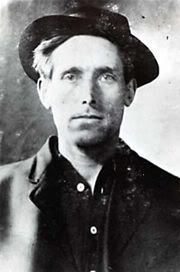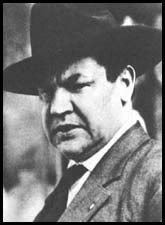Don't Mourn, Organize! Part 1
cross posted from dailyKos

Joe Hill (1879-1915)
Joe Hill, radical songwriter, labor activist, and Wobblie (member of the Industrial Workers of the World), was executed for murder in Utah in 1915 after an extremely controversial trial. Just before his execution, according to Howard Zinn, he wrote to Big Bill Haywood, "Don't waste any time in mourning. Organize." That's right. He wrote, "Don't mourn, organize!"
Why am I telling you this century old story of American labor radicals? Why now? It's simple. There is something in these stories to inspire us to move beyond theoretical, electoral politics, beyond despair and frustration, and to consider again engaging in direct action to change our society.

Big Bill Haywood (1868-1928)
Big Bill Haywood, to whom Hill wrote, was a founder of the Western Federation of Miners (WFM) and also a Wobblie. He was an advocate for industrial as opposed to craft unionism, for organizing unions without regard to the ethnicity of the workers, and most important, he was an advocate for direct action as opposed to political action. As this Wiki explains
Joe Hill and Big Bill lived a century ago. Together they tell us, "Don't mourn, organize! Use direct action to confront evil and to make changes. Use the "industrial ballot." They don't suggest that change can occur using solely political action and electoral politics. Over a hundred years ago they used confrontational, direct action tactics to fight to bring miners the 8-hour day.
How exactly did the state react to all this? As you would expect, very badly. In fact, this part of the story, the repressive, violent, illegal, unconstitutional part, will sound eerily familiar to you:
This should not be a surprise. The state responded illegally. Habeas corpus was abrogated. Statutes were ignored and declared unconstitutional by stooge courts. Elections were ignored. Corporate power superseded basic democratic rights. Repression and state violence ruled.
I can imagine that there might be objections to this story I am telling. You'd be entirely correct to argue that Big Bill Haywood and Joe Hill were radicals. They were Socialists. They were Wobblies. Some would argue they were anarchists and criminals. They were the left flank in 1905. They were what inspired radical changes in America at the turn of the last century. The objections are that surely, after a century, the same tactics cannot work. My argument is simple: they can.
For inspiration in 2007, when we so sorely need it, I suggest we look again at those on the far, left flank a century ago. That's where the fire is. That's where the inspiration is. And that's where the change in our society has always, always come from, from the radical left. And that change has always been fostered by a willingness to engage in direct action in conjunction with electoral politics.
This, too, shouldn't be a surprise. Fifty years ago, Dr. Martin Luther King recognized the importance and validity of direct action as a tactic in his Letter from the Birmingham Jail:
And so, in light of the past 6 years and the horrendous list of illegal, unconstitutional acts by the Government, a list that I will not bother to recount here, I think it's time for us to reconsider the role that direct action can now play in restoring America to its most Democratic, humane, and decent principles.
I want to urge us through the Iraq Moratorium Day on 9/21/07 and on any other occasion that comes along to consider direct action to restore the American Democracy. If recent events have shown us anything, we cannot rely on electoral politics alone to safeguard our important rights.

Joe Hill (1879-1915)
Joe Hill, radical songwriter, labor activist, and Wobblie (member of the Industrial Workers of the World), was executed for murder in Utah in 1915 after an extremely controversial trial. Just before his execution, according to Howard Zinn, he wrote to Big Bill Haywood, "Don't waste any time in mourning. Organize." That's right. He wrote, "Don't mourn, organize!"
Why am I telling you this century old story of American labor radicals? Why now? It's simple. There is something in these stories to inspire us to move beyond theoretical, electoral politics, beyond despair and frustration, and to consider again engaging in direct action to change our society.

Big Bill Haywood (1868-1928)
Big Bill Haywood, to whom Hill wrote, was a founder of the Western Federation of Miners (WFM) and also a Wobblie. He was an advocate for industrial as opposed to craft unionism, for organizing unions without regard to the ethnicity of the workers, and most important, he was an advocate for direct action as opposed to political action. As this Wiki explains
Haywood favored direct action. The socialist philosophy — which WFM supporter the Rev. Fr. Thomas J. Hagerty called "slowcialism" — did not seem hard-nosed enough for Haywood's labor instincts. After the Boise murder trial, he had come to believe,It is to the ignominy of the Socialist Party and the Socialist Labor Party that they have so seldom joined forces with the I.W.W. in these desperate political struggles.
While Haywood continued to champion direct action, he advocated the political action favored by the socialists as just one more mechanism for change, and only when it seemed relevant. At an October 1913 meeting of the Socialist Party, Haywood stated:I advocate the industrial ballot alone when I address the workers in the textile industries of the East where a great majority are foreigners without political representation. But when I speak to American workingmen in the West I advocate both the industrial and the political ballot.
The "industrial ballot" referred to the methods (strikes, slowdowns, etc.) of the IWW.
Joe Hill and Big Bill lived a century ago. Together they tell us, "Don't mourn, organize! Use direct action to confront evil and to make changes. Use the "industrial ballot." They don't suggest that change can occur using solely political action and electoral politics. Over a hundred years ago they used confrontational, direct action tactics to fight to bring miners the 8-hour day.
How exactly did the state react to all this? As you would expect, very badly. In fact, this part of the story, the repressive, violent, illegal, unconstitutional part, will sound eerily familiar to you:
In the WFM's 1903-05 struggle in Colorado, with martial law once again in force, two declarations uttered by the National Guard and recorded for posterity further clarified the relationship of the mine operator's enforcement army — provided courtesy of the Colorado governor — to the workers. When union attorneys asked the courts to free illegally imprisoned strikers, Adjutant General Sherman Bell declared, "Habeas corpus be damned, we'll give 'em post mortems." Reminded of the Constitution, one of Bell's junior officers declared coolly, "To hell with the Constitution. We're not going by the Constitution."
General Bell had been the manager of one of the coal mines in Cripple Creek where the strike was taking place. It wasn't any surprise to Haywood that soldiers seemed to be working in the interests of the employers; he had seen that situation before. But when the Colorado legislature acknowledged the complaints of organized labor and passed an eight hour law, the Colorado supreme court declared it unconstitutional. So the WFM took the issue to the voters, and 72 percent of the state's voters approved the referendum. But the Cololorado government ignored the results of the referendum.
To members of the WFM, it became clear that government favored the companies, and only direct action by organized workers could secure the eight hour day for themselves. When miners in Idaho Springs and Telluride decided to strike for the eight hour day, they were rounded up at gunpoint by vigilante groups and expelled from their communities. Warrants were issued for the arrest of the law-breaking vigilantes, but they were not acted upon.
Haywood complained that John D. Rockefeller was "wielding more power with his golf sticks than could the people of Colorado with their ballots."
This should not be a surprise. The state responded illegally. Habeas corpus was abrogated. Statutes were ignored and declared unconstitutional by stooge courts. Elections were ignored. Corporate power superseded basic democratic rights. Repression and state violence ruled.
I can imagine that there might be objections to this story I am telling. You'd be entirely correct to argue that Big Bill Haywood and Joe Hill were radicals. They were Socialists. They were Wobblies. Some would argue they were anarchists and criminals. They were the left flank in 1905. They were what inspired radical changes in America at the turn of the last century. The objections are that surely, after a century, the same tactics cannot work. My argument is simple: they can.
For inspiration in 2007, when we so sorely need it, I suggest we look again at those on the far, left flank a century ago. That's where the fire is. That's where the inspiration is. And that's where the change in our society has always, always come from, from the radical left. And that change has always been fostered by a willingness to engage in direct action in conjunction with electoral politics.
This, too, shouldn't be a surprise. Fifty years ago, Dr. Martin Luther King recognized the importance and validity of direct action as a tactic in his Letter from the Birmingham Jail:
You may well ask: "Why direct action? Why sit-ins, marches and so forth? Isn't negotiation a better path?" You are quite right in calling, for negotiation. Indeed, this is the very purpose of direct action. Nonviolent direct action seeks to create such a crisis and foster such a tension that a community which has constantly refused to negotiate is forced to confront the issue. It seeks so to dramatize the issue that it can no longer be ignored. My citing the creation of tension as part of the work of the nonviolent-resister may sound rather shocking. But I must confess that I am not afraid of the word "tension." I have earnestly opposed violent tension, but there is a type of constructive, nonviolent tension which is necessary for growth. Just as Socrates felt that it was necessary to create a tension in the mind so that individuals could rise from the bondage of myths and half-truths to the unfettered realm of creative analysis and objective appraisal, we must we see the need for nonviolent gadflies to create the kind of tension in society that will help men rise from the dark depths of prejudice and racism to the majestic heights of understanding and brotherhood.
And so, in light of the past 6 years and the horrendous list of illegal, unconstitutional acts by the Government, a list that I will not bother to recount here, I think it's time for us to reconsider the role that direct action can now play in restoring America to its most Democratic, humane, and decent principles.
I want to urge us through the Iraq Moratorium Day on 9/21/07 and on any other occasion that comes along to consider direct action to restore the American Democracy. If recent events have shown us anything, we cannot rely on electoral politics alone to safeguard our important rights.






0 Comments:
Publicar un comentario
<< Home